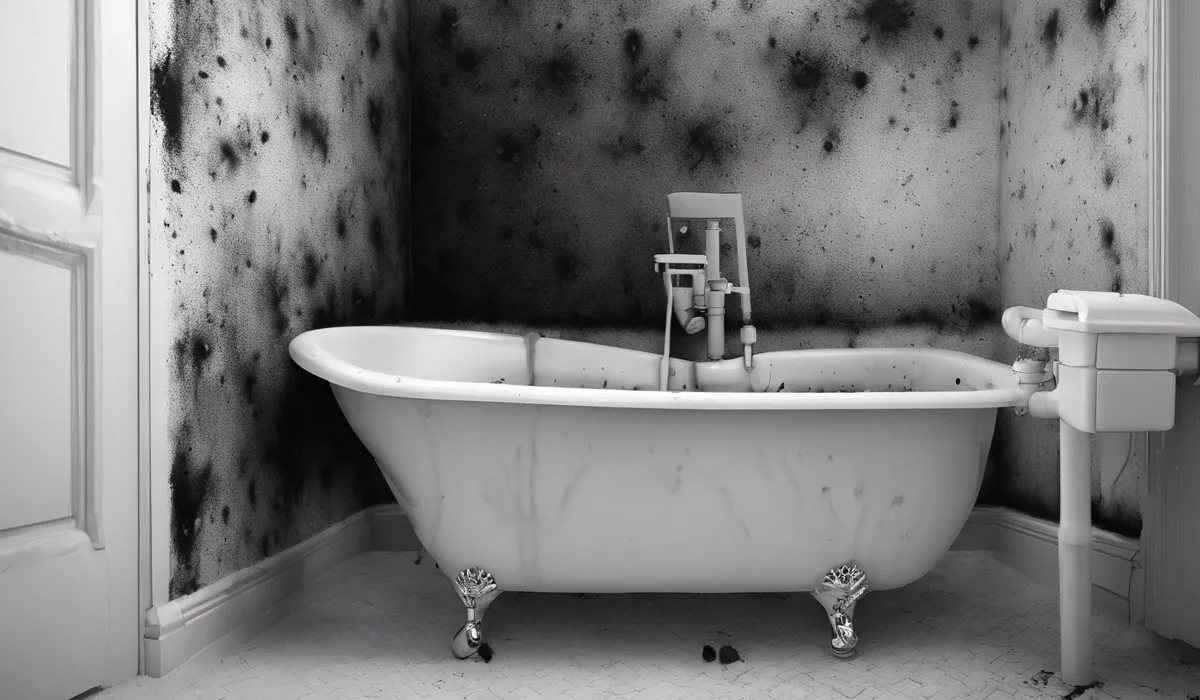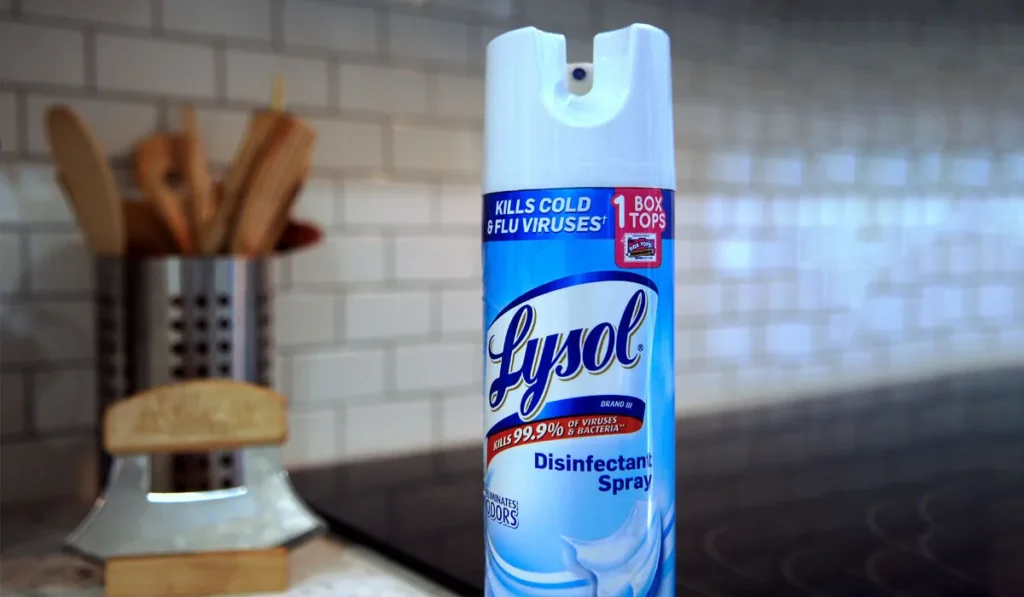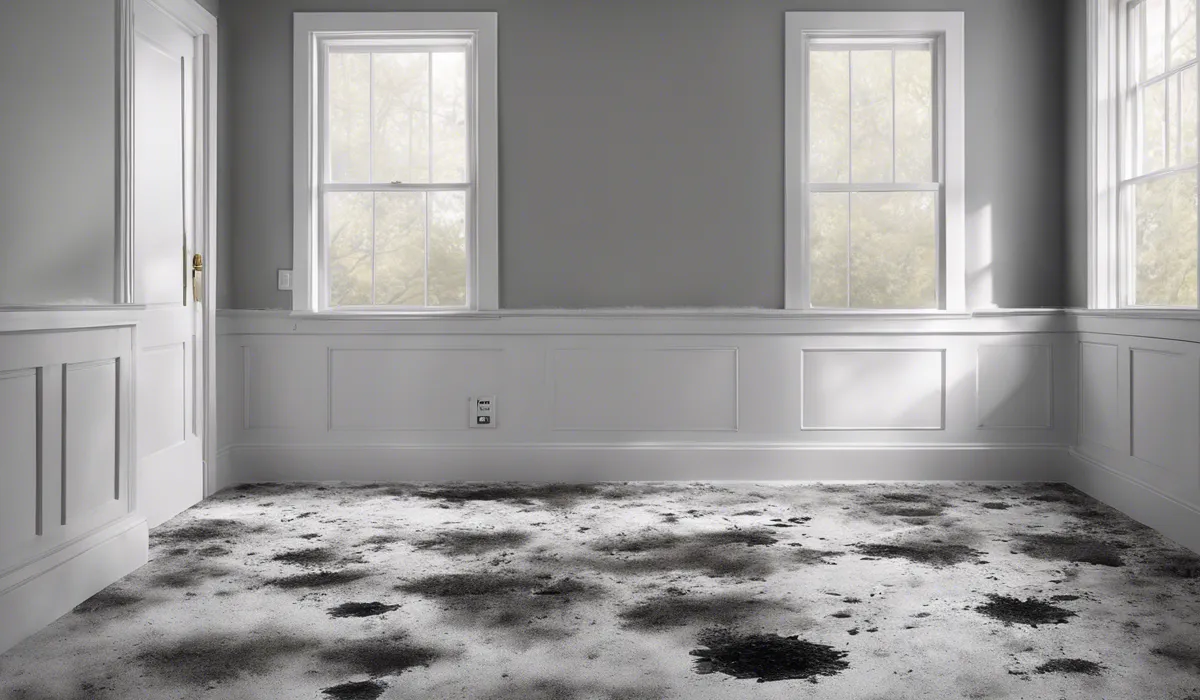Lysol can kill surface black mold on non-porous surfaces. Its disinfectant spray is designed to kill various mold species. However, Lysol may not penetrate porous surfaces to eliminate mold at its roots. For complete removal, professional mold remediation might be necessary.
Understanding Black Mold

What is Black Mold?
Black mold, scientifically known as Stachybotrys chartarum, is a type of microfungus that appears as dark patches on various surfaces.
It thrives in damp, humid, and warm conditions, often found in places where water damage has occurred.
This mold is known for its slimy texture and its dark color, which can range from greenish-black to black.
Health Concerns Posed by Black Mold
Exposure to black mold spores can lead to various health issues, especially for individuals with allergies, asthma, or weakened immune systems.
Symptoms can include chronic coughing, sneezing, irritation of the eyes and skin, and in severe cases, mold exposure can lead to more serious respiratory problems.
Black Mold Hotspots in Buildings
Black mold is commonly found in areas with persistent moisture. This includes bathrooms, basements, kitchens, and around leaky windows or pipes.
Anywhere with water damage or high humidity can create a perfect breeding ground for mold spores to settle and grow.
Why Mold Remediation Matters?
Removing mold correctly is crucial to prevent its spread and to protect the health of building occupants.
Professional mold remediation ensures that all mold is removed safely and that measures are taken to prevent future growth, keeping living and working environments healthy.
The Effectiveness of Lysol Against Mold

Lysol: A Popular Disinfectant
Lysol is a well-known brand that produces cleaning and disinfecting products. Its solutions are designed to eliminate bacteria and viruses, and many people also use it to tackle mold issues in their homes.
Key Ingredients in Lysol That Fight Mold
Lysol products contain ingredients like benzalkonium chloride and ethanol/alcohol which are effective against a wide range of microorganisms, including some mold species.
These components work by breaking down the structure of the mold, leading to its death.
Research on Lysol’s Mold-Killing Power
Studies have shown that Lysol can effectively kill certain types of mold on hard, non-porous surfaces.
However, it is important to note that the effectiveness can vary based on the concentration of the active ingredients and the type of surface being treated.
Lysol’s Limitations on Porous Surfaces
While Lysol can kill surface mold, its ability to penetrate porous materials like wood or drywall is limited.
Black mold can root deeply into these materials, and surface treatments may not reach the mold’s entire structure. This can result in the mold returning over time.
Best Practices for Mold Removal

Evaluating the Mold Situation
Before attempting to remove mold, it’s essential to assess the extent of the problem. Small areas of mold can often be managed by homeowners, but large infestations require professional attention.
When to Call the Mold Experts?
If the area affected by mold is extensive, or if there are health concerns for the occupants, it’s time to call in certified mold remediation professionals.
They have the expertise and equipment to safely and effectively remove the mold.
Using Lysol to Kill Surface Mold
For small mold problems, Lysol can be used as follows: first, clean the area with soap and water, then spray Lysol directly onto the mold and let it sit for a few minutes.
Afterward, scrub the area to remove the mold and wipe it clean.
Preventing Mold’s Return
After removing mold, take steps to prevent it from coming back. This includes controlling humidity levels, fixing leaks, and ensuring proper ventilation in moisture-prone areas.
Fixing the Root Cause: Moisture Control
Ultimately, the key to preventing mold growth is controlling moisture. Use dehumidifiers, repair plumbing leaks, and improve drainage around the building to keep the environment dry and inhospitable to mold.
FAQs About Can Lysol Kill Black Mold
Can Lysol effectively kill black mold on surfaces?
Yes, Lysol can effectively kill black mold on non-porous surfaces such as glass, metal, or plastic.
Is Lysol disinfectant spray able to eliminate all types of mold?
Lysol disinfectant spray is designed to kill various mold species, but it may not be effective against all types.
Can Lysol remove mold from porous materials like wood or drywall?
No, Lysol may not penetrate porous surfaces sufficiently to eliminate mold at its roots, potentially requiring professional remediation for complete removal.
Is it necessary to hire professionals for mold remediation after using Lysol?
For complete removal of mold, especially in cases of extensive infestation or on porous surfaces, professional mold remediation might be necessary.
Does Lysol prevent mold from coming back?
Lysol can help kill existing mold, but it does not necessarily prevent future mold growth. Addressing the underlying moisture issue is crucial for long-term prevention.
Final Thoughts
Lysol is effective in killing black mold on non-porous surfaces, making it a viable option for surface disinfection.
Its formulation targets various mold species. However, its effectiveness is limited on porous materials where mold can grow beneath the surface.
For thorough eradication of mold, especially in deep-rooted cases, seeking professional mold remediation services is recommended.
